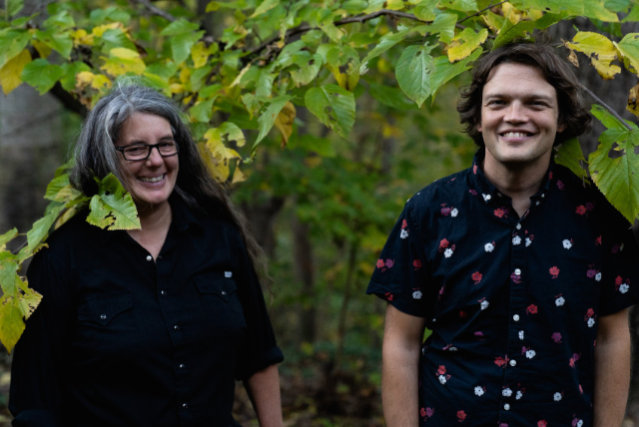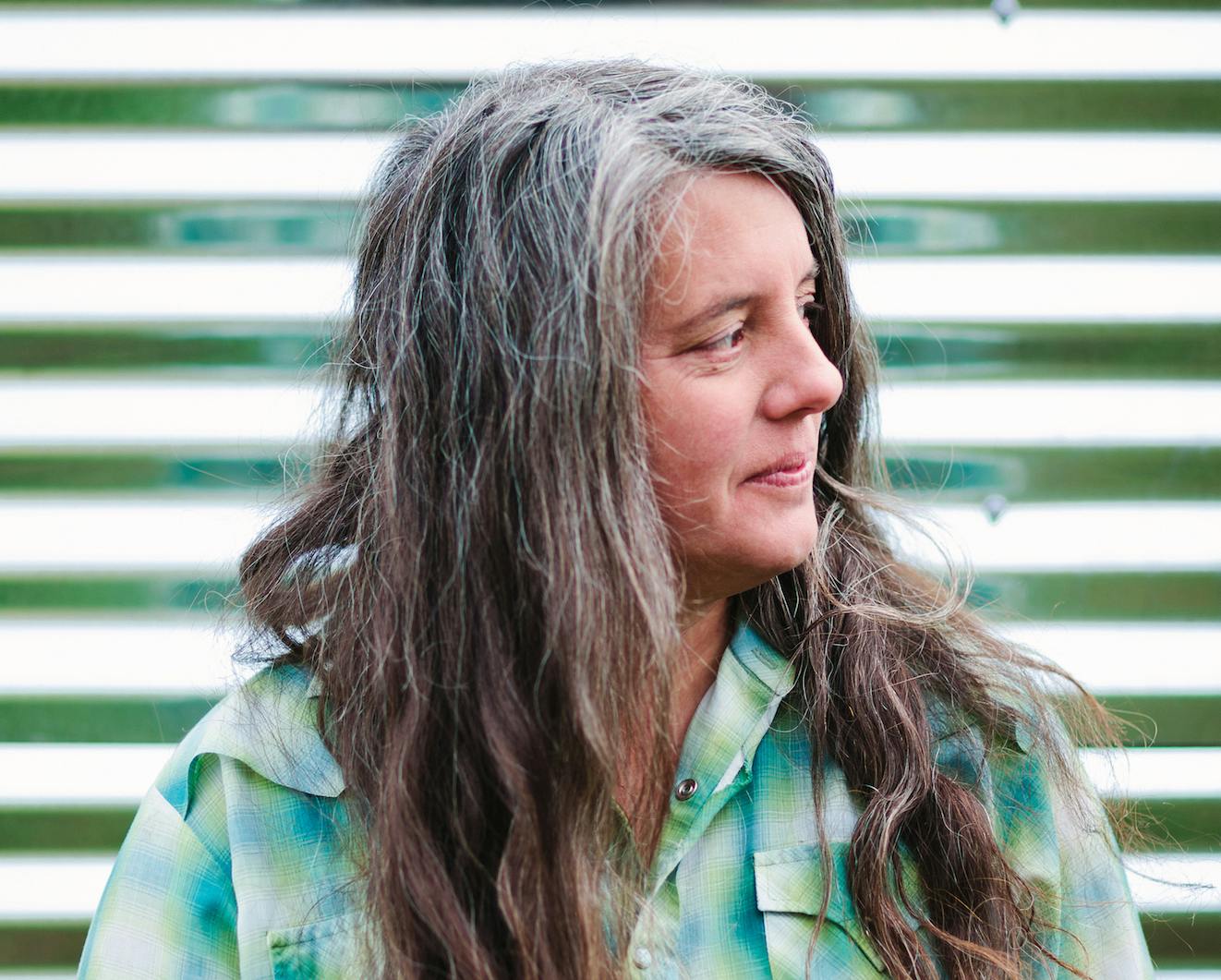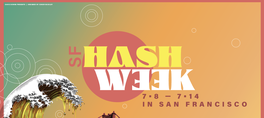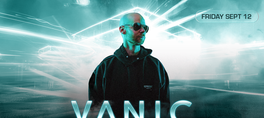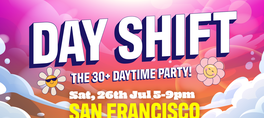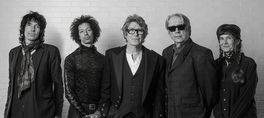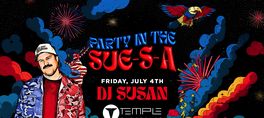Guitarists Marisa Anderson and William Tyler distill deeply rooted and varied traditions into distinctive voices all their own. Anderson and Tyler are each unyielding in their desire to extend through those traditions and the confines of "guitar music" to craft music at once intimate and expansive, conversational and transcendent. The duo's debut collaborative album tethers together their singular voices into unified narratives that glisten, drive, and sway. On Lost Futures, Anderson and Tyler's guitars dance through lush arrangements and pastoral duets serpentine and reverent.
The kindred musicians first collaborated in the days following a Portland show commemorating the life of the late David Berman. As Anderson tells it, "There was an obvious and immediate affinity musically and personally which led to the feeling that we should try and do something together, but in January of 2020, both of us had pretty full schedules so it was more of a vague idea to do something, someday... then COVID hit." With tours sidelined and the increasing tensions of isolation, unrest and ecological disaster looming, the duo set to composing and collaborating remotely. Tyler joined Anderson in Portland for a week before recording as protests across the city escalated and raging wildfires cast a dangerous haze. Against the tumultuous backdrop the duo found harmony in their quick, organic development as a compositional team. Rich ballads and breezy rambles flourished as the duo explored new rhythmic techniques and elaborated on unused riffs. In uniting to meditate on their musical practices together, the two guitarists composed music filled with the joy of playing together while having a sober tone reflective of the troubled state of the world around them.
Lost Futures takes its name from writer Mark Fisher's cultural theory of the loss of potential futures, the hopes and ideals which once felt inevitable but have since been interrupted. Anderson and Tyler's use of textural drones, rhythmic repetition and harmonic shifts embody the building tensions of uncertainty created by profound loss: loss of life, experience, companionship, compassion. "For every choice made, every path taken, there are multitudes of choices not made, paths not taken," notes Anderson. "At the Edge of the World" manifests the energy of perpetual momentum through string player Gisela Rodriguez Fernandez's staccato jabs and the clicking scrapes of patricia vázquez gómez's quijada. The unison melody of "Pray For Rain" sounds as a chorus collectively asking when relief will come. A drone-via-repetition on "Something Will Come'' invokes a sonic mirage that suspends reality as subtle yet revelatory changes froth from beneath the haze. Still, hope and catharsis find a way to shine through the mire in the duo's implementation of space and tonal balance. With title track "Lost Futures," Anderson and Tyler's lullabye-like counter melodies lace around one another with the gentle ease of a friendly embrace.
Across Lost Futures, Anderson and Tyler mold their instruments into breathtaking panoramas of blight and bliss. Each movement contains a dense biome of transportive sound. The duo's music together reckons with mounting pressures as well as the joy of newfound friendship and gratitude for being able to play together. In tandem, Marisa Anderson and William Tyler have composed a work of remarkable breadth, brimming with resplendent odes of solace.
~~~~~~~~
Marisa Anderson is a wanderer at heart, creatively as curious as she is proficient. On Cloud Corner, Anderson's music is boundless. Rooted in American folk music, her pieces are inspired by 20th century classical and West African guitar techniques. The results are revelatory. Written and recorded in a period of political and personal upheaval, the album was created as a refuge, an ode to stillness in an era of ceaseless noise. Marisa Anderson's Cloud Corner is an album of remarkably intimate beauty, tranquility in times of turmoil.Anderson's composing is indelibly tied to her process of recording. As her own engineer, Anderson is able to develop her pieces while recording, shifting from song to song as inspiration strikes. After at times months of ruminating on musical and conceptual ideas, she improvises hours of material which then is often whittled into the concise, richly textured compositions. As the pieces of Cloud Corner developed, a distinct mood began to settle over the album, with long reverb tails, cleaner tones, and lightly bouncing rhythms evoking air, wind, breath, and the sky. Themes continued evolving as she recorded, as Anderson began embellishing pieces with varied instrumentation, from the warble of her Wurtlitzer keyboard to the staccato plucks of the requinto jarocho.Anderson is able to evoke vivid visuals through her music, and Cloud Corner draws on personal experience for those images. A great example is the sorrowful "Angel's Rest," a eulogy to one of Anderson's favorite trails near her Portland home, which was devastated in 2017 by fire. "Sant Feliu de Guíxols" elicits the beauty of the coastal Spanish town. It is a quietly and consciously happy song triggered by a conversation with a fan who accused Anderson of only playing sad songs. Anderson uses a slide and incorporates microtonal elements on "Lament," a song inspired by images of the Syrian refugee crisis. The palpable emotional weight of these pieces are all invariably tied to Anderson's capacity to create such vivid imagery with her composition, timbre and tonal choices.
Marisa Anderson's experience in a myriad playing styles and keen abilities as an improviser are perfect skills to satiate her appetite for new approaches to composing. The backbone for her music is her undeniable mastery of North American traditions of country, folk, and blues. Cloud Corner sees Anderson using those skills in new forms from the Classical canon such as the fugue and ostinato. Traversing further still, guitar phrases on tracks like "Slow Ascent" and "Surfacing" owe a debt to the Tuareg style of guitar playing. Anderson was influenced by artists she played or recorded with such as Mdou Moctar, Kildjate Moussa Albadé, and Ahmoudou Madassane. Inspiration was also drawn from unique stringed instruments Anderson utilized such as the requinto jarocho and charango, which helped flesh out the riff of "Lift."
The solo guitar work of Marisa Anderson owes its familiar tones to her awareness of history and her mastering of her instrument, yet it is completely new. Marisa Anderson filters musical history through her own personal experiences, as a traveler in life and in music. A curious and gifted player, Anderson has spent over 35 years of playing forging her singular, instantly recognizable voice. Marisa Anderson's Cloud Corner is hopeful in the face of any discord, a resplendent diverse sound sanctuary that shines, a mirror of the horizon it looks towards.
show less
The kindred musicians first collaborated in the days following a Portland show commemorating the life of the late David Berman. As Anderson tells it, "There was an obvious and immediate affinity musically and personally which led to the feeling that we should try and do something together, but in January of 2020, both of us had pretty full schedules so it was more of a vague idea to do something, someday... then COVID hit." With tours sidelined and the increasing tensions of isolation, unrest and ecological disaster looming, the duo set to composing and collaborating remotely. Tyler joined Anderson in Portland for a week before recording as protests across the city escalated and raging wildfires cast a dangerous haze. Against the tumultuous backdrop the duo found harmony in their quick, organic development as a compositional team. Rich ballads and breezy rambles flourished as the duo explored new rhythmic techniques and elaborated on unused riffs. In uniting to meditate on their musical practices together, the two guitarists composed music filled with the joy of playing together while having a sober tone reflective of the troubled state of the world around them.
Lost Futures takes its name from writer Mark Fisher's cultural theory of the loss of potential futures, the hopes and ideals which once felt inevitable but have since been interrupted. Anderson and Tyler's use of textural drones, rhythmic repetition and harmonic shifts embody the building tensions of uncertainty created by profound loss: loss of life, experience, companionship, compassion. "For every choice made, every path taken, there are multitudes of choices not made, paths not taken," notes Anderson. "At the Edge of the World" manifests the energy of perpetual momentum through string player Gisela Rodriguez Fernandez's staccato jabs and the clicking scrapes of patricia vázquez gómez's quijada. The unison melody of "Pray For Rain" sounds as a chorus collectively asking when relief will come. A drone-via-repetition on "Something Will Come'' invokes a sonic mirage that suspends reality as subtle yet revelatory changes froth from beneath the haze. Still, hope and catharsis find a way to shine through the mire in the duo's implementation of space and tonal balance. With title track "Lost Futures," Anderson and Tyler's lullabye-like counter melodies lace around one another with the gentle ease of a friendly embrace.
Across Lost Futures, Anderson and Tyler mold their instruments into breathtaking panoramas of blight and bliss. Each movement contains a dense biome of transportive sound. The duo's music together reckons with mounting pressures as well as the joy of newfound friendship and gratitude for being able to play together. In tandem, Marisa Anderson and William Tyler have composed a work of remarkable breadth, brimming with resplendent odes of solace.
~~~~~~~~
Marisa Anderson is a wanderer at heart, creatively as curious as she is proficient. On Cloud Corner, Anderson's music is boundless. Rooted in American folk music, her pieces are inspired by 20th century classical and West African guitar techniques. The results are revelatory. Written and recorded in a period of political and personal upheaval, the album was created as a refuge, an ode to stillness in an era of ceaseless noise. Marisa Anderson's Cloud Corner is an album of remarkably intimate beauty, tranquility in times of turmoil.Anderson's composing is indelibly tied to her process of recording. As her own engineer, Anderson is able to develop her pieces while recording, shifting from song to song as inspiration strikes. After at times months of ruminating on musical and conceptual ideas, she improvises hours of material which then is often whittled into the concise, richly textured compositions. As the pieces of Cloud Corner developed, a distinct mood began to settle over the album, with long reverb tails, cleaner tones, and lightly bouncing rhythms evoking air, wind, breath, and the sky. Themes continued evolving as she recorded, as Anderson began embellishing pieces with varied instrumentation, from the warble of her Wurtlitzer keyboard to the staccato plucks of the requinto jarocho.Anderson is able to evoke vivid visuals through her music, and Cloud Corner draws on personal experience for those images. A great example is the sorrowful "Angel's Rest," a eulogy to one of Anderson's favorite trails near her Portland home, which was devastated in 2017 by fire. "Sant Feliu de Guíxols" elicits the beauty of the coastal Spanish town. It is a quietly and consciously happy song triggered by a conversation with a fan who accused Anderson of only playing sad songs. Anderson uses a slide and incorporates microtonal elements on "Lament," a song inspired by images of the Syrian refugee crisis. The palpable emotional weight of these pieces are all invariably tied to Anderson's capacity to create such vivid imagery with her composition, timbre and tonal choices.
Marisa Anderson's experience in a myriad playing styles and keen abilities as an improviser are perfect skills to satiate her appetite for new approaches to composing. The backbone for her music is her undeniable mastery of North American traditions of country, folk, and blues. Cloud Corner sees Anderson using those skills in new forms from the Classical canon such as the fugue and ostinato. Traversing further still, guitar phrases on tracks like "Slow Ascent" and "Surfacing" owe a debt to the Tuareg style of guitar playing. Anderson was influenced by artists she played or recorded with such as Mdou Moctar, Kildjate Moussa Albadé, and Ahmoudou Madassane. Inspiration was also drawn from unique stringed instruments Anderson utilized such as the requinto jarocho and charango, which helped flesh out the riff of "Lift."
The solo guitar work of Marisa Anderson owes its familiar tones to her awareness of history and her mastering of her instrument, yet it is completely new. Marisa Anderson filters musical history through her own personal experiences, as a traveler in life and in music. A curious and gifted player, Anderson has spent over 35 years of playing forging her singular, instantly recognizable voice. Marisa Anderson's Cloud Corner is hopeful in the face of any discord, a resplendent diverse sound sanctuary that shines, a mirror of the horizon it looks towards.
Guitarists Marisa Anderson and William Tyler distill deeply rooted and varied traditions into distinctive voices all their own. Anderson and Tyler are each unyielding in their desire to extend through those traditions and the confines of "guitar music" to craft music at once intimate and expansive, conversational and transcendent. The duo's debut collaborative album tethers together their singular voices into unified narratives that glisten, drive, and sway. On Lost Futures, Anderson and Tyler's guitars dance through lush arrangements and pastoral duets serpentine and reverent.
The kindred musicians first collaborated in the days following a Portland show commemorating the life of the late David Berman. As Anderson tells it, "There was an obvious and immediate affinity musically and personally which led to the feeling that we should try and do something together, but in January of 2020, both of us had pretty full schedules so it was more of a vague idea to do something, someday... then COVID hit." With tours sidelined and the increasing tensions of isolation, unrest and ecological disaster looming, the duo set to composing and collaborating remotely. Tyler joined Anderson in Portland for a week before recording as protests across the city escalated and raging wildfires cast a dangerous haze. Against the tumultuous backdrop the duo found harmony in their quick, organic development as a compositional team. Rich ballads and breezy rambles flourished as the duo explored new rhythmic techniques and elaborated on unused riffs. In uniting to meditate on their musical practices together, the two guitarists composed music filled with the joy of playing together while having a sober tone reflective of the troubled state of the world around them.
Lost Futures takes its name from writer Mark Fisher's cultural theory of the loss of potential futures, the hopes and ideals which once felt inevitable but have since been interrupted. Anderson and Tyler's use of textural drones, rhythmic repetition and harmonic shifts embody the building tensions of uncertainty created by profound loss: loss of life, experience, companionship, compassion. "For every choice made, every path taken, there are multitudes of choices not made, paths not taken," notes Anderson. "At the Edge of the World" manifests the energy of perpetual momentum through string player Gisela Rodriguez Fernandez's staccato jabs and the clicking scrapes of patricia vázquez gómez's quijada. The unison melody of "Pray For Rain" sounds as a chorus collectively asking when relief will come. A drone-via-repetition on "Something Will Come'' invokes a sonic mirage that suspends reality as subtle yet revelatory changes froth from beneath the haze. Still, hope and catharsis find a way to shine through the mire in the duo's implementation of space and tonal balance. With title track "Lost Futures," Anderson and Tyler's lullabye-like counter melodies lace around one another with the gentle ease of a friendly embrace.
Across Lost Futures, Anderson and Tyler mold their instruments into breathtaking panoramas of blight and bliss. Each movement contains a dense biome of transportive sound. The duo's music together reckons with mounting pressures as well as the joy of newfound friendship and gratitude for being able to play together. In tandem, Marisa Anderson and William Tyler have composed a work of remarkable breadth, brimming with resplendent odes of solace.
~~~~~~~~
Marisa Anderson is a wanderer at heart, creatively as curious as she is proficient. On Cloud Corner, Anderson's music is boundless. Rooted in American folk music, her pieces are inspired by 20th century classical and West African guitar techniques. The results are revelatory. Written and recorded in a period of political and personal upheaval, the album was created as a refuge, an ode to stillness in an era of ceaseless noise. Marisa Anderson's Cloud Corner is an album of remarkably intimate beauty, tranquility in times of turmoil.Anderson's composing is indelibly tied to her process of recording. As her own engineer, Anderson is able to develop her pieces while recording, shifting from song to song as inspiration strikes. After at times months of ruminating on musical and conceptual ideas, she improvises hours of material which then is often whittled into the concise, richly textured compositions. As the pieces of Cloud Corner developed, a distinct mood began to settle over the album, with long reverb tails, cleaner tones, and lightly bouncing rhythms evoking air, wind, breath, and the sky. Themes continued evolving as she recorded, as Anderson began embellishing pieces with varied instrumentation, from the warble of her Wurtlitzer keyboard to the staccato plucks of the requinto jarocho.Anderson is able to evoke vivid visuals through her music, and Cloud Corner draws on personal experience for those images. A great example is the sorrowful "Angel's Rest," a eulogy to one of Anderson's favorite trails near her Portland home, which was devastated in 2017 by fire. "Sant Feliu de Guíxols" elicits the beauty of the coastal Spanish town. It is a quietly and consciously happy song triggered by a conversation with a fan who accused Anderson of only playing sad songs. Anderson uses a slide and incorporates microtonal elements on "Lament," a song inspired by images of the Syrian refugee crisis. The palpable emotional weight of these pieces are all invariably tied to Anderson's capacity to create such vivid imagery with her composition, timbre and tonal choices.
Marisa Anderson's experience in a myriad playing styles and keen abilities as an improviser are perfect skills to satiate her appetite for new approaches to composing. The backbone for her music is her undeniable mastery of North American traditions of country, folk, and blues. Cloud Corner sees Anderson using those skills in new forms from the Classical canon such as the fugue and ostinato. Traversing further still, guitar phrases on tracks like "Slow Ascent" and "Surfacing" owe a debt to the Tuareg style of guitar playing. Anderson was influenced by artists she played or recorded with such as Mdou Moctar, Kildjate Moussa Albadé, and Ahmoudou Madassane. Inspiration was also drawn from unique stringed instruments Anderson utilized such as the requinto jarocho and charango, which helped flesh out the riff of "Lift."
The solo guitar work of Marisa Anderson owes its familiar tones to her awareness of history and her mastering of her instrument, yet it is completely new. Marisa Anderson filters musical history through her own personal experiences, as a traveler in life and in music. A curious and gifted player, Anderson has spent over 35 years of playing forging her singular, instantly recognizable voice. Marisa Anderson's Cloud Corner is hopeful in the face of any discord, a resplendent diverse sound sanctuary that shines, a mirror of the horizon it looks towards.
read more
The kindred musicians first collaborated in the days following a Portland show commemorating the life of the late David Berman. As Anderson tells it, "There was an obvious and immediate affinity musically and personally which led to the feeling that we should try and do something together, but in January of 2020, both of us had pretty full schedules so it was more of a vague idea to do something, someday... then COVID hit." With tours sidelined and the increasing tensions of isolation, unrest and ecological disaster looming, the duo set to composing and collaborating remotely. Tyler joined Anderson in Portland for a week before recording as protests across the city escalated and raging wildfires cast a dangerous haze. Against the tumultuous backdrop the duo found harmony in their quick, organic development as a compositional team. Rich ballads and breezy rambles flourished as the duo explored new rhythmic techniques and elaborated on unused riffs. In uniting to meditate on their musical practices together, the two guitarists composed music filled with the joy of playing together while having a sober tone reflective of the troubled state of the world around them.
Lost Futures takes its name from writer Mark Fisher's cultural theory of the loss of potential futures, the hopes and ideals which once felt inevitable but have since been interrupted. Anderson and Tyler's use of textural drones, rhythmic repetition and harmonic shifts embody the building tensions of uncertainty created by profound loss: loss of life, experience, companionship, compassion. "For every choice made, every path taken, there are multitudes of choices not made, paths not taken," notes Anderson. "At the Edge of the World" manifests the energy of perpetual momentum through string player Gisela Rodriguez Fernandez's staccato jabs and the clicking scrapes of patricia vázquez gómez's quijada. The unison melody of "Pray For Rain" sounds as a chorus collectively asking when relief will come. A drone-via-repetition on "Something Will Come'' invokes a sonic mirage that suspends reality as subtle yet revelatory changes froth from beneath the haze. Still, hope and catharsis find a way to shine through the mire in the duo's implementation of space and tonal balance. With title track "Lost Futures," Anderson and Tyler's lullabye-like counter melodies lace around one another with the gentle ease of a friendly embrace.
Across Lost Futures, Anderson and Tyler mold their instruments into breathtaking panoramas of blight and bliss. Each movement contains a dense biome of transportive sound. The duo's music together reckons with mounting pressures as well as the joy of newfound friendship and gratitude for being able to play together. In tandem, Marisa Anderson and William Tyler have composed a work of remarkable breadth, brimming with resplendent odes of solace.
~~~~~~~~
Marisa Anderson is a wanderer at heart, creatively as curious as she is proficient. On Cloud Corner, Anderson's music is boundless. Rooted in American folk music, her pieces are inspired by 20th century classical and West African guitar techniques. The results are revelatory. Written and recorded in a period of political and personal upheaval, the album was created as a refuge, an ode to stillness in an era of ceaseless noise. Marisa Anderson's Cloud Corner is an album of remarkably intimate beauty, tranquility in times of turmoil.Anderson's composing is indelibly tied to her process of recording. As her own engineer, Anderson is able to develop her pieces while recording, shifting from song to song as inspiration strikes. After at times months of ruminating on musical and conceptual ideas, she improvises hours of material which then is often whittled into the concise, richly textured compositions. As the pieces of Cloud Corner developed, a distinct mood began to settle over the album, with long reverb tails, cleaner tones, and lightly bouncing rhythms evoking air, wind, breath, and the sky. Themes continued evolving as she recorded, as Anderson began embellishing pieces with varied instrumentation, from the warble of her Wurtlitzer keyboard to the staccato plucks of the requinto jarocho.Anderson is able to evoke vivid visuals through her music, and Cloud Corner draws on personal experience for those images. A great example is the sorrowful "Angel's Rest," a eulogy to one of Anderson's favorite trails near her Portland home, which was devastated in 2017 by fire. "Sant Feliu de Guíxols" elicits the beauty of the coastal Spanish town. It is a quietly and consciously happy song triggered by a conversation with a fan who accused Anderson of only playing sad songs. Anderson uses a slide and incorporates microtonal elements on "Lament," a song inspired by images of the Syrian refugee crisis. The palpable emotional weight of these pieces are all invariably tied to Anderson's capacity to create such vivid imagery with her composition, timbre and tonal choices.
Marisa Anderson's experience in a myriad playing styles and keen abilities as an improviser are perfect skills to satiate her appetite for new approaches to composing. The backbone for her music is her undeniable mastery of North American traditions of country, folk, and blues. Cloud Corner sees Anderson using those skills in new forms from the Classical canon such as the fugue and ostinato. Traversing further still, guitar phrases on tracks like "Slow Ascent" and "Surfacing" owe a debt to the Tuareg style of guitar playing. Anderson was influenced by artists she played or recorded with such as Mdou Moctar, Kildjate Moussa Albadé, and Ahmoudou Madassane. Inspiration was also drawn from unique stringed instruments Anderson utilized such as the requinto jarocho and charango, which helped flesh out the riff of "Lift."
The solo guitar work of Marisa Anderson owes its familiar tones to her awareness of history and her mastering of her instrument, yet it is completely new. Marisa Anderson filters musical history through her own personal experiences, as a traveler in life and in music. A curious and gifted player, Anderson has spent over 35 years of playing forging her singular, instantly recognizable voice. Marisa Anderson's Cloud Corner is hopeful in the face of any discord, a resplendent diverse sound sanctuary that shines, a mirror of the horizon it looks towards.
show less
Date/Times:
The Independent
88 Upcoming Events
628 Divisadero Street, San Francisco, CA 94117
The Best Events
Every Week in Your Inbox
From Our Sponsors
UPCOMING EVENTS
Great suggestion! We'll be in touch.
Event reviewed successfully.
